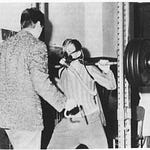
In Story 1 of my personal experiences with ideological drama in academic peer review, we learned of an editorial assistant who resigned from her post because the journal she worked for decided to accept for publication my forthcoming paper on Woke medicine. This was certainly an unusual and dramatic tale, but the story I am about to share, Story 2, is my most concerning experience with peer review
In 2020, I submitted an opinion article to the high-ranking exercise journal, Sports Medicine. In the paper, I commented on the hot-button issue of female participant “underrepresentation.” In my paper, I challenged the narrative within exercise and sports science that discrimination against women is the cause of fewer female than male participants in exercise experiments.
The journal’s editor, a man who I have had many positive interactions with over the years, sent my paper to five anonymous reviewers for critique. This is about two more reviewers than is normal for exercise journals. The totality of their critiques led the editor to reject my paper from being considered for publication at the journal.
A journal rejection is not the nicest news to receive, but one does get used to them after being in research for several years. However, this rejection was particularly hard to swallow given the inability of the reviewers to understand the central arguments that I was making. But most concerningly was the feedback from Reviewer #5. In arguing for why they thought my paper should not be published, Reviewer #5 stated the following:
“Data be damned, I know women are understudied and you will not convince me otherwise. Perceptions trump data.”
This comment is, by far, the most insane comment I have received in 16 years of having my worked critiqued by peer reviewers. It is insane because the whole purpose of science, and then peer review, is to evaluate the validity of an idea based on the evidence provided. The data are the evidence. The data are intended to be the best that two people can do in putting their personal biases aside and allowing reality to do the talking. If reviewers believe that “perceptions trump data,” then there is no longer a purpose in conducting or summarizing the results from scientific experiments. Moreover, there is no reason to write up results from such experiments into a paper and have others appraise them if the results are simply to be “damned” by a reviewer who cannot put their subjective whims and emotions aside.

Given Reviewer #5’s fundamentally incoherent appraisal of my work, I appealed the review. I asked the editor to reconsider my paper based on the fact that Reviewer #5 has no business serving as a peer reviewer for a scientific journal, considering that the reviewer does not believe in the purpose and procedure of scientific investigation. In other words, my argument to the editor was that Reviewer #5 was not cognitively fit to serve as a reviewer for any paper submitted to the journal.
This was the first and only time I have ever attempted to appeal a review of one of my rejected papers. The editor considered my appeal. He requested the opinion of other editors on the matter. But in the end, my paper was still rejected.
This story shows how science can be impacted by the biases and subjective whims of ideological peer reviewers, who are activists more than they are scientists. Had an author submitted a paper claiming the opposite of my thesis, but without any supporting data, Reviewer #5 likely would have accepted it for publication. Based on the poor quality of papers published on this topic of female “underrepresentation” in exercise research trials, Reviewer #5 is likely not alone in thinking that perceptions should trump data in the review process.
Nevertheless, this story does end on a positive note. A few months after my paper was rejected by Sports Medicine, I submitted the paper to the journal Quest, albeit with a less provocative title and some more finely tuned arguments. Luckily, a different set of peer reviewers reviewed this version of the paper, and they were more appreciative of the evidence-based argument that I was making. The paper was eventually published in February of 2021 under the title, Volunteer Bias and Female Participation in Exercise and Sports Science Research.
Related Content at The Nuzzo Letter
SUPPORT THE NUZZO LETTER
If you appreciated this content, please consider supporting The Nuzzo Letter with a one-time or recurring donation. Your support is greatly appreciated. It helps me to continue to work on independent research projects and fight for more evidence-based discourse. To donate, click the DonorBox logo. In two simple steps, you can donate using ApplePay, PayPal, or another service. Thank you.



















Share this post